Leadership and Management of Dementia: A Comprehensive Report
VerifiedAdded on 2023/01/13
|24
|8654
|58
Report
AI Summary
This report delves into the critical aspects of dementia management, focusing on the application of various leadership and management theories to improve patient care. It begins with an executive summary outlining the core issues and objectives, followed by an introduction that defines dementia and its impact on individuals. The report establishes clear aims and objectives, justifying the need for effective leadership in managing this complex condition. It explores a range of leadership theories, including situational, contingency, systems, transactional, transformational, participative, trait, behavioral, scientific, bureaucratic, and autocratic models, alongside change management theories like Kotter's 8-step model and Lewin's 3-stage model. The project outline includes a detailed project timeline visualized through a Gantt chart. The report analyzes how these theories can be applied to enhance the skills of nursing staff and improve clinical practices in dementia care. The conclusion and recommendations offer insights into best practices for managing dementia effectively, supported by a comprehensive list of references. The report emphasizes the importance of personalized care and the role of effective leadership in ensuring positive patient outcomes, making it a valuable resource for healthcare professionals and students alike.
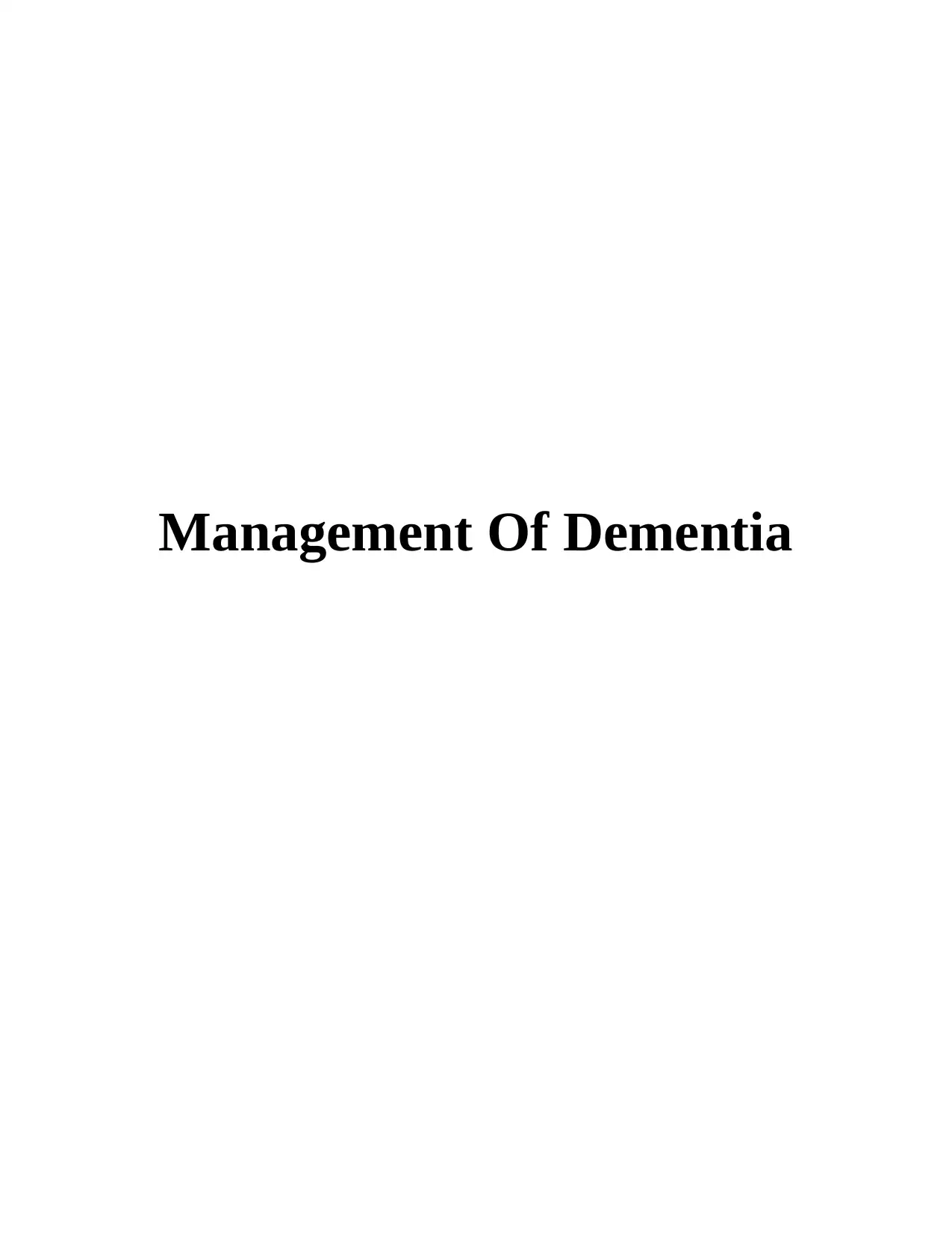
Management Of Dementia
Paraphrase This Document
Need a fresh take? Get an instant paraphrase of this document with our AI Paraphraser
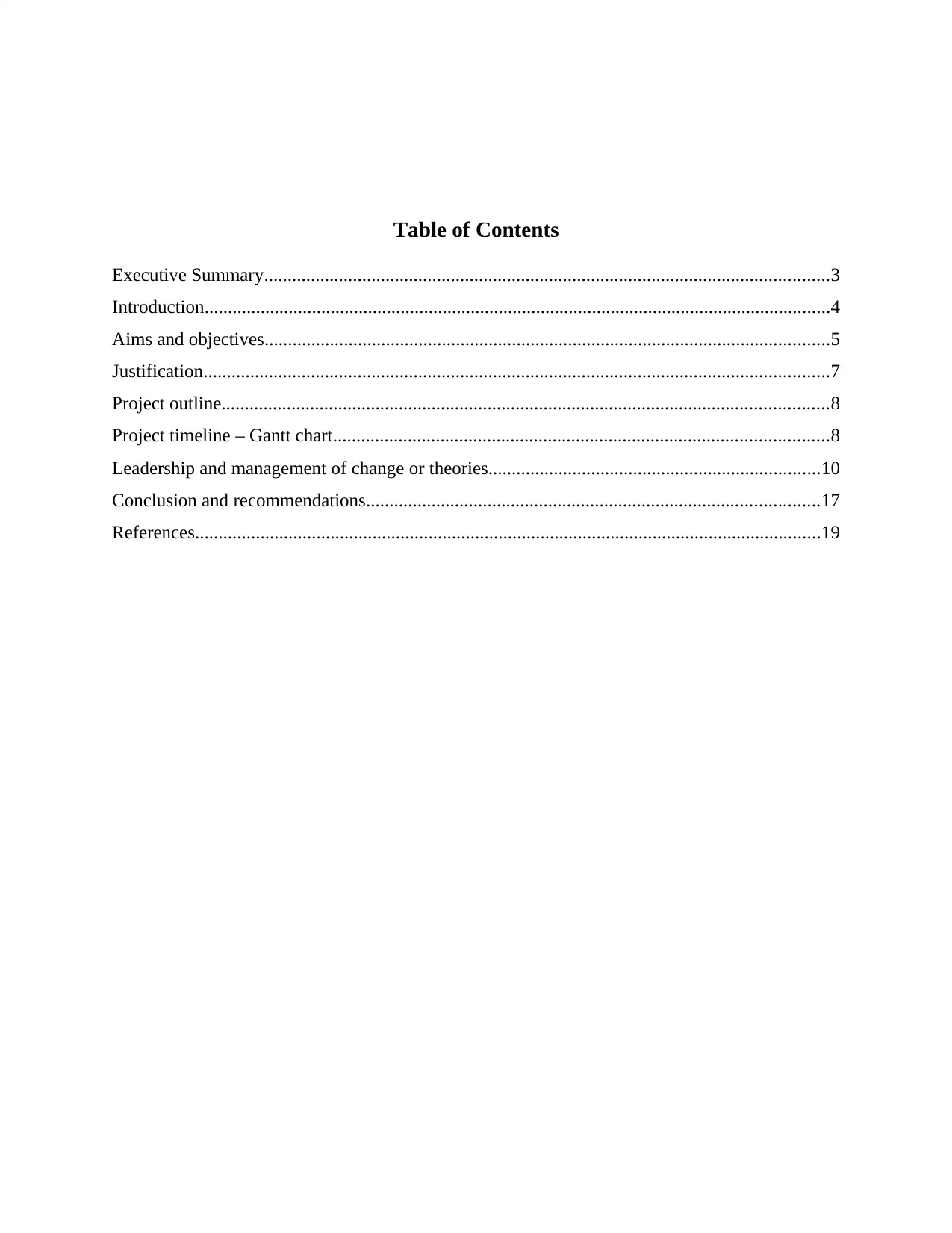
Table of Contents
Executive Summary.........................................................................................................................3
Introduction......................................................................................................................................4
Aims and objectives.........................................................................................................................5
Justification......................................................................................................................................7
Project outline..................................................................................................................................8
Project timeline – Gantt chart..........................................................................................................8
Leadership and management of change or theories.......................................................................10
Conclusion and recommendations.................................................................................................17
References......................................................................................................................................19
Executive Summary.........................................................................................................................3
Introduction......................................................................................................................................4
Aims and objectives.........................................................................................................................5
Justification......................................................................................................................................7
Project outline..................................................................................................................................8
Project timeline – Gantt chart..........................................................................................................8
Leadership and management of change or theories.......................................................................10
Conclusion and recommendations.................................................................................................17
References......................................................................................................................................19

⊘ This is a preview!⊘
Do you want full access?
Subscribe today to unlock all pages.

Trusted by 1+ million students worldwide
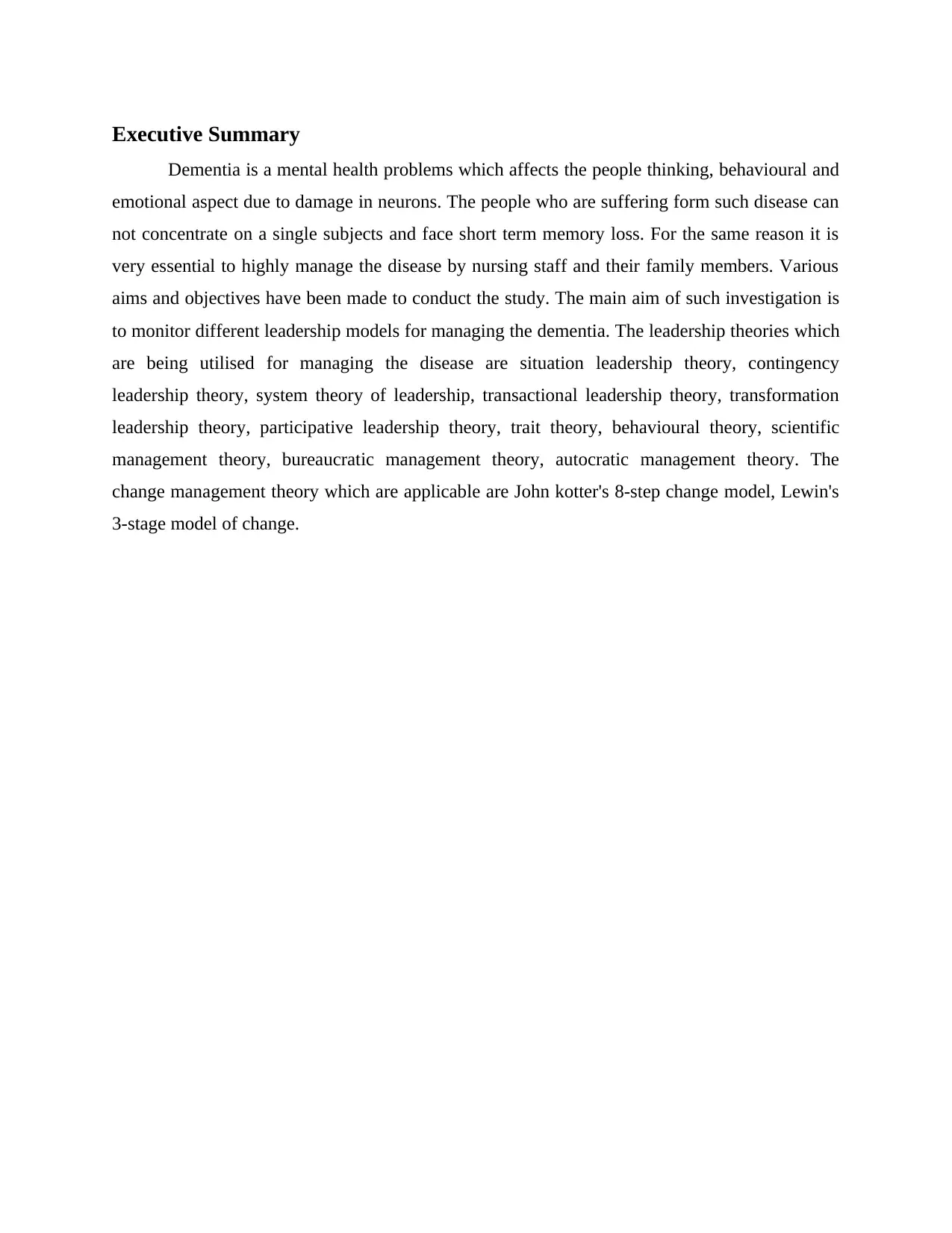
Executive Summary
Dementia is a mental health problems which affects the people thinking, behavioural and
emotional aspect due to damage in neurons. The people who are suffering form such disease can
not concentrate on a single subjects and face short term memory loss. For the same reason it is
very essential to highly manage the disease by nursing staff and their family members. Various
aims and objectives have been made to conduct the study. The main aim of such investigation is
to monitor different leadership models for managing the dementia. The leadership theories which
are being utilised for managing the disease are situation leadership theory, contingency
leadership theory, system theory of leadership, transactional leadership theory, transformation
leadership theory, participative leadership theory, trait theory, behavioural theory, scientific
management theory, bureaucratic management theory, autocratic management theory. The
change management theory which are applicable are John kotter's 8-step change model, Lewin's
3-stage model of change.
Dementia is a mental health problems which affects the people thinking, behavioural and
emotional aspect due to damage in neurons. The people who are suffering form such disease can
not concentrate on a single subjects and face short term memory loss. For the same reason it is
very essential to highly manage the disease by nursing staff and their family members. Various
aims and objectives have been made to conduct the study. The main aim of such investigation is
to monitor different leadership models for managing the dementia. The leadership theories which
are being utilised for managing the disease are situation leadership theory, contingency
leadership theory, system theory of leadership, transactional leadership theory, transformation
leadership theory, participative leadership theory, trait theory, behavioural theory, scientific
management theory, bureaucratic management theory, autocratic management theory. The
change management theory which are applicable are John kotter's 8-step change model, Lewin's
3-stage model of change.
Paraphrase This Document
Need a fresh take? Get an instant paraphrase of this document with our AI Paraphraser
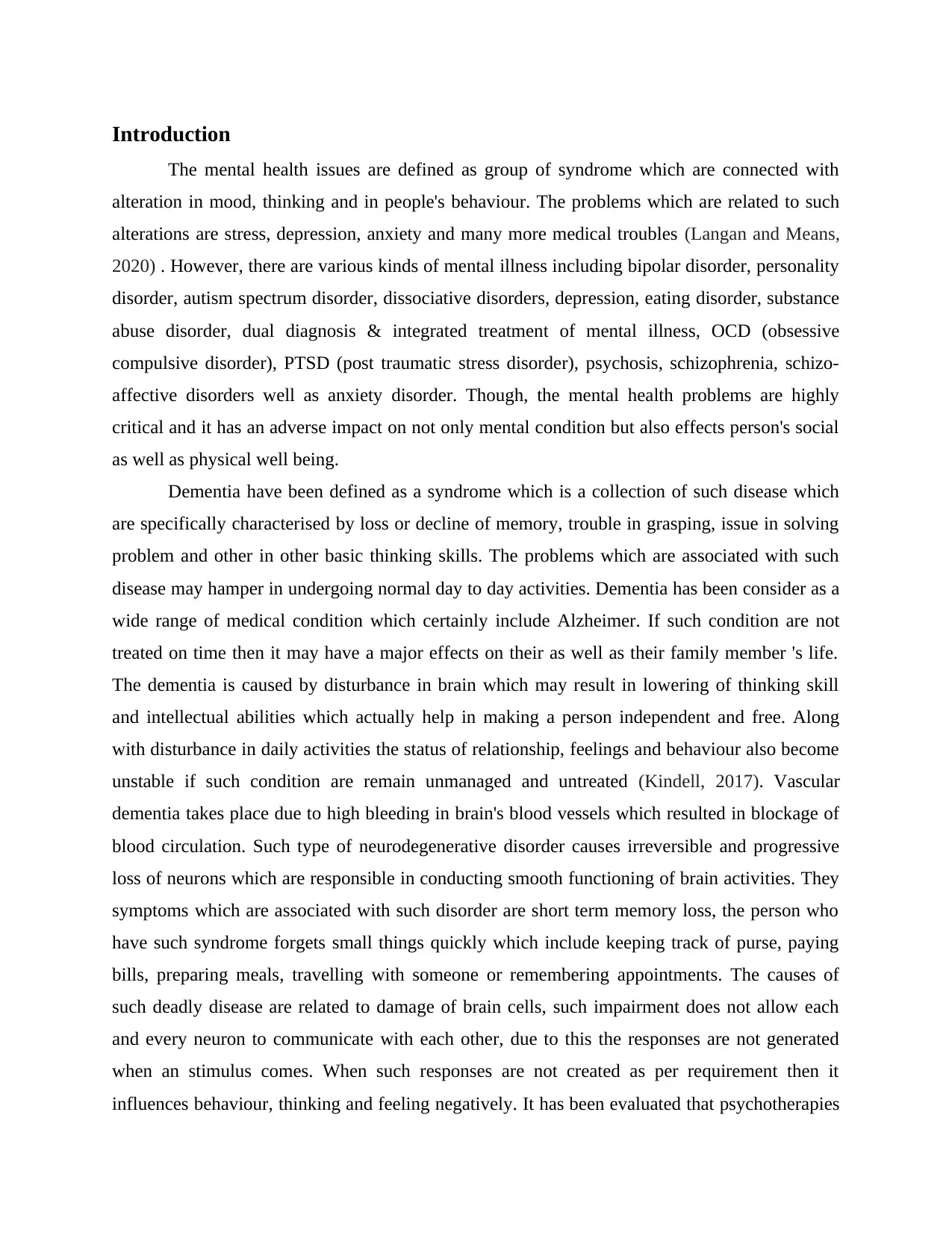
Introduction
The mental health issues are defined as group of syndrome which are connected with
alteration in mood, thinking and in people's behaviour. The problems which are related to such
alterations are stress, depression, anxiety and many more medical troubles (Langan and Means,
2020) . However, there are various kinds of mental illness including bipolar disorder, personality
disorder, autism spectrum disorder, dissociative disorders, depression, eating disorder, substance
abuse disorder, dual diagnosis & integrated treatment of mental illness, OCD (obsessive
compulsive disorder), PTSD (post traumatic stress disorder), psychosis, schizophrenia, schizo-
affective disorders well as anxiety disorder. Though, the mental health problems are highly
critical and it has an adverse impact on not only mental condition but also effects person's social
as well as physical well being.
Dementia have been defined as a syndrome which is a collection of such disease which
are specifically characterised by loss or decline of memory, trouble in grasping, issue in solving
problem and other in other basic thinking skills. The problems which are associated with such
disease may hamper in undergoing normal day to day activities. Dementia has been consider as a
wide range of medical condition which certainly include Alzheimer. If such condition are not
treated on time then it may have a major effects on their as well as their family member 's life.
The dementia is caused by disturbance in brain which may result in lowering of thinking skill
and intellectual abilities which actually help in making a person independent and free. Along
with disturbance in daily activities the status of relationship, feelings and behaviour also become
unstable if such condition are remain unmanaged and untreated (Kindell, 2017). Vascular
dementia takes place due to high bleeding in brain's blood vessels which resulted in blockage of
blood circulation. Such type of neurodegenerative disorder causes irreversible and progressive
loss of neurons which are responsible in conducting smooth functioning of brain activities. They
symptoms which are associated with such disorder are short term memory loss, the person who
have such syndrome forgets small things quickly which include keeping track of purse, paying
bills, preparing meals, travelling with someone or remembering appointments. The causes of
such deadly disease are related to damage of brain cells, such impairment does not allow each
and every neuron to communicate with each other, due to this the responses are not generated
when an stimulus comes. When such responses are not created as per requirement then it
influences behaviour, thinking and feeling negatively. It has been evaluated that psychotherapies
The mental health issues are defined as group of syndrome which are connected with
alteration in mood, thinking and in people's behaviour. The problems which are related to such
alterations are stress, depression, anxiety and many more medical troubles (Langan and Means,
2020) . However, there are various kinds of mental illness including bipolar disorder, personality
disorder, autism spectrum disorder, dissociative disorders, depression, eating disorder, substance
abuse disorder, dual diagnosis & integrated treatment of mental illness, OCD (obsessive
compulsive disorder), PTSD (post traumatic stress disorder), psychosis, schizophrenia, schizo-
affective disorders well as anxiety disorder. Though, the mental health problems are highly
critical and it has an adverse impact on not only mental condition but also effects person's social
as well as physical well being.
Dementia have been defined as a syndrome which is a collection of such disease which
are specifically characterised by loss or decline of memory, trouble in grasping, issue in solving
problem and other in other basic thinking skills. The problems which are associated with such
disease may hamper in undergoing normal day to day activities. Dementia has been consider as a
wide range of medical condition which certainly include Alzheimer. If such condition are not
treated on time then it may have a major effects on their as well as their family member 's life.
The dementia is caused by disturbance in brain which may result in lowering of thinking skill
and intellectual abilities which actually help in making a person independent and free. Along
with disturbance in daily activities the status of relationship, feelings and behaviour also become
unstable if such condition are remain unmanaged and untreated (Kindell, 2017). Vascular
dementia takes place due to high bleeding in brain's blood vessels which resulted in blockage of
blood circulation. Such type of neurodegenerative disorder causes irreversible and progressive
loss of neurons which are responsible in conducting smooth functioning of brain activities. They
symptoms which are associated with such disorder are short term memory loss, the person who
have such syndrome forgets small things quickly which include keeping track of purse, paying
bills, preparing meals, travelling with someone or remembering appointments. The causes of
such deadly disease are related to damage of brain cells, such impairment does not allow each
and every neuron to communicate with each other, due to this the responses are not generated
when an stimulus comes. When such responses are not created as per requirement then it
influences behaviour, thinking and feeling negatively. It has been evaluated that psychotherapies
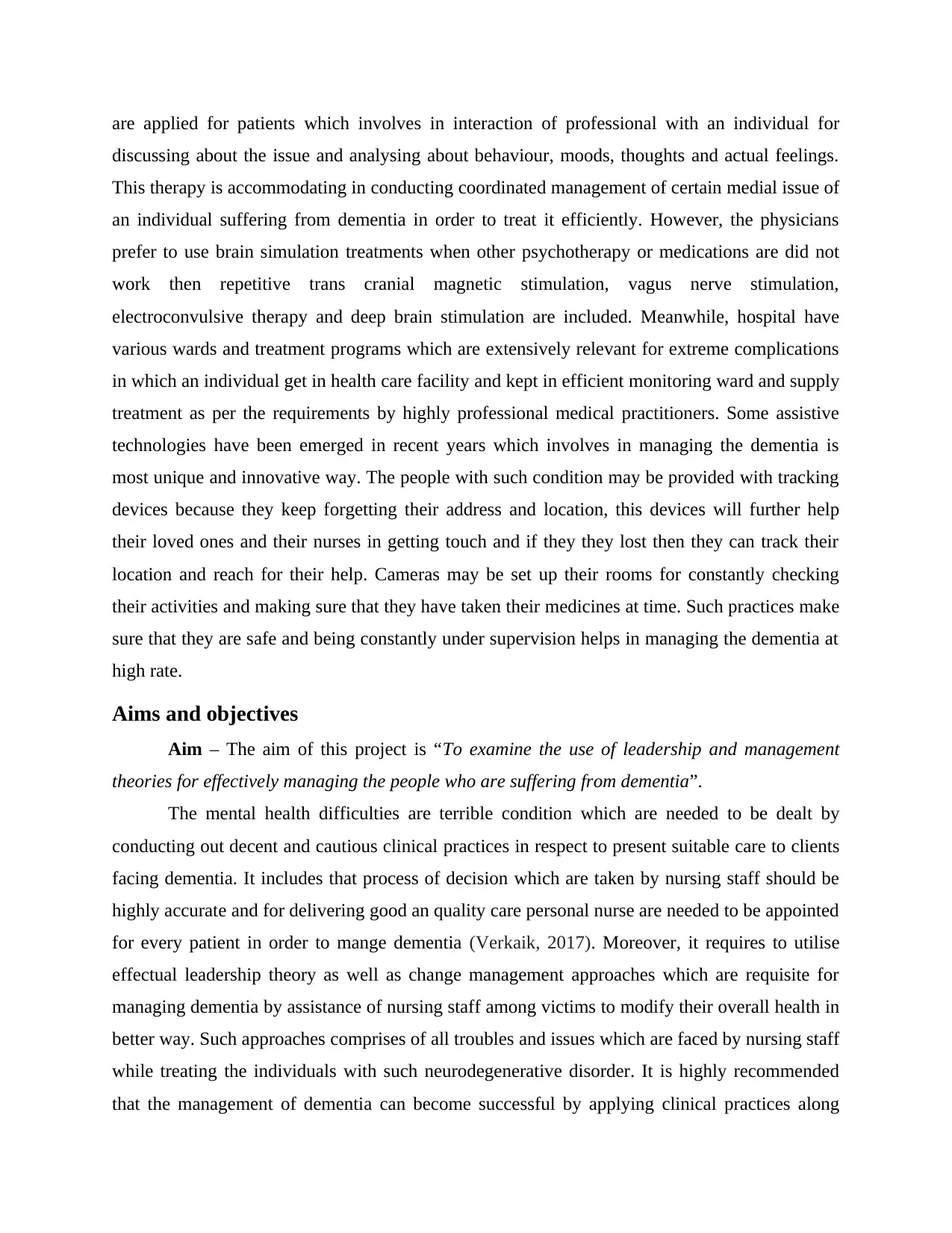
are applied for patients which involves in interaction of professional with an individual for
discussing about the issue and analysing about behaviour, moods, thoughts and actual feelings.
This therapy is accommodating in conducting coordinated management of certain medial issue of
an individual suffering from dementia in order to treat it efficiently. However, the physicians
prefer to use brain simulation treatments when other psychotherapy or medications are did not
work then repetitive trans cranial magnetic stimulation, vagus nerve stimulation,
electroconvulsive therapy and deep brain stimulation are included. Meanwhile, hospital have
various wards and treatment programs which are extensively relevant for extreme complications
in which an individual get in health care facility and kept in efficient monitoring ward and supply
treatment as per the requirements by highly professional medical practitioners. Some assistive
technologies have been emerged in recent years which involves in managing the dementia is
most unique and innovative way. The people with such condition may be provided with tracking
devices because they keep forgetting their address and location, this devices will further help
their loved ones and their nurses in getting touch and if they they lost then they can track their
location and reach for their help. Cameras may be set up their rooms for constantly checking
their activities and making sure that they have taken their medicines at time. Such practices make
sure that they are safe and being constantly under supervision helps in managing the dementia at
high rate.
Aims and objectives
Aim – The aim of this project is “To examine the use of leadership and management
theories for effectively managing the people who are suffering from dementia”.
The mental health difficulties are terrible condition which are needed to be dealt by
conducting out decent and cautious clinical practices in respect to present suitable care to clients
facing dementia. It includes that process of decision which are taken by nursing staff should be
highly accurate and for delivering good an quality care personal nurse are needed to be appointed
for every patient in order to mange dementia (Verkaik, 2017). Moreover, it requires to utilise
effectual leadership theory as well as change management approaches which are requisite for
managing dementia by assistance of nursing staff among victims to modify their overall health in
better way. Such approaches comprises of all troubles and issues which are faced by nursing staff
while treating the individuals with such neurodegenerative disorder. It is highly recommended
that the management of dementia can become successful by applying clinical practices along
discussing about the issue and analysing about behaviour, moods, thoughts and actual feelings.
This therapy is accommodating in conducting coordinated management of certain medial issue of
an individual suffering from dementia in order to treat it efficiently. However, the physicians
prefer to use brain simulation treatments when other psychotherapy or medications are did not
work then repetitive trans cranial magnetic stimulation, vagus nerve stimulation,
electroconvulsive therapy and deep brain stimulation are included. Meanwhile, hospital have
various wards and treatment programs which are extensively relevant for extreme complications
in which an individual get in health care facility and kept in efficient monitoring ward and supply
treatment as per the requirements by highly professional medical practitioners. Some assistive
technologies have been emerged in recent years which involves in managing the dementia is
most unique and innovative way. The people with such condition may be provided with tracking
devices because they keep forgetting their address and location, this devices will further help
their loved ones and their nurses in getting touch and if they they lost then they can track their
location and reach for their help. Cameras may be set up their rooms for constantly checking
their activities and making sure that they have taken their medicines at time. Such practices make
sure that they are safe and being constantly under supervision helps in managing the dementia at
high rate.
Aims and objectives
Aim – The aim of this project is “To examine the use of leadership and management
theories for effectively managing the people who are suffering from dementia”.
The mental health difficulties are terrible condition which are needed to be dealt by
conducting out decent and cautious clinical practices in respect to present suitable care to clients
facing dementia. It includes that process of decision which are taken by nursing staff should be
highly accurate and for delivering good an quality care personal nurse are needed to be appointed
for every patient in order to mange dementia (Verkaik, 2017). Moreover, it requires to utilise
effectual leadership theory as well as change management approaches which are requisite for
managing dementia by assistance of nursing staff among victims to modify their overall health in
better way. Such approaches comprises of all troubles and issues which are faced by nursing staff
while treating the individuals with such neurodegenerative disorder. It is highly recommended
that the management of dementia can become successful by applying clinical practices along
⊘ This is a preview!⊘
Do you want full access?
Subscribe today to unlock all pages.

Trusted by 1+ million students worldwide
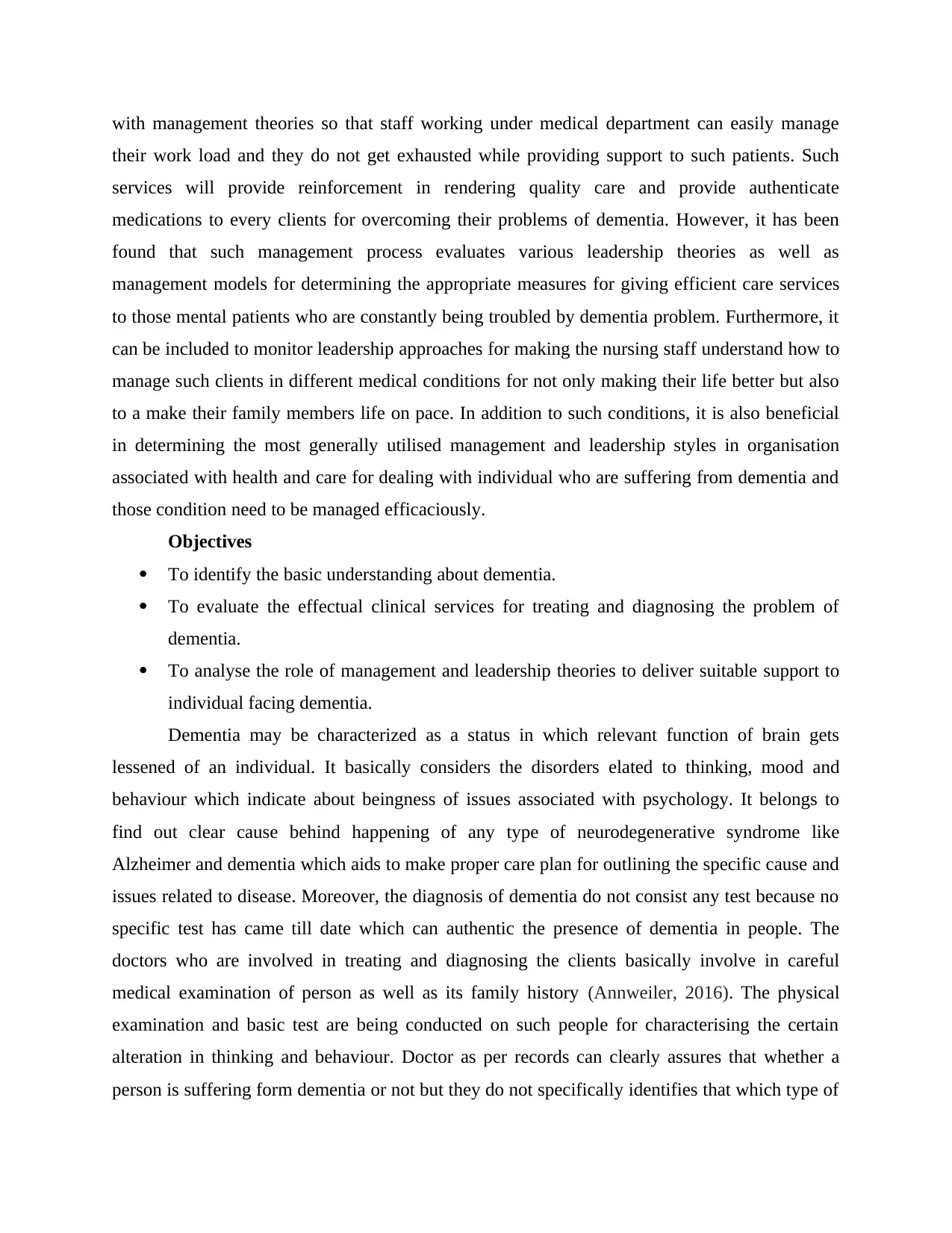
with management theories so that staff working under medical department can easily manage
their work load and they do not get exhausted while providing support to such patients. Such
services will provide reinforcement in rendering quality care and provide authenticate
medications to every clients for overcoming their problems of dementia. However, it has been
found that such management process evaluates various leadership theories as well as
management models for determining the appropriate measures for giving efficient care services
to those mental patients who are constantly being troubled by dementia problem. Furthermore, it
can be included to monitor leadership approaches for making the nursing staff understand how to
manage such clients in different medical conditions for not only making their life better but also
to a make their family members life on pace. In addition to such conditions, it is also beneficial
in determining the most generally utilised management and leadership styles in organisation
associated with health and care for dealing with individual who are suffering from dementia and
those condition need to be managed efficaciously.
Objectives
To identify the basic understanding about dementia.
To evaluate the effectual clinical services for treating and diagnosing the problem of
dementia.
To analyse the role of management and leadership theories to deliver suitable support to
individual facing dementia.
Dementia may be characterized as a status in which relevant function of brain gets
lessened of an individual. It basically considers the disorders elated to thinking, mood and
behaviour which indicate about beingness of issues associated with psychology. It belongs to
find out clear cause behind happening of any type of neurodegenerative syndrome like
Alzheimer and dementia which aids to make proper care plan for outlining the specific cause and
issues related to disease. Moreover, the diagnosis of dementia do not consist any test because no
specific test has came till date which can authentic the presence of dementia in people. The
doctors who are involved in treating and diagnosing the clients basically involve in careful
medical examination of person as well as its family history (Annweiler, 2016). The physical
examination and basic test are being conducted on such people for characterising the certain
alteration in thinking and behaviour. Doctor as per records can clearly assures that whether a
person is suffering form dementia or not but they do not specifically identifies that which type of
their work load and they do not get exhausted while providing support to such patients. Such
services will provide reinforcement in rendering quality care and provide authenticate
medications to every clients for overcoming their problems of dementia. However, it has been
found that such management process evaluates various leadership theories as well as
management models for determining the appropriate measures for giving efficient care services
to those mental patients who are constantly being troubled by dementia problem. Furthermore, it
can be included to monitor leadership approaches for making the nursing staff understand how to
manage such clients in different medical conditions for not only making their life better but also
to a make their family members life on pace. In addition to such conditions, it is also beneficial
in determining the most generally utilised management and leadership styles in organisation
associated with health and care for dealing with individual who are suffering from dementia and
those condition need to be managed efficaciously.
Objectives
To identify the basic understanding about dementia.
To evaluate the effectual clinical services for treating and diagnosing the problem of
dementia.
To analyse the role of management and leadership theories to deliver suitable support to
individual facing dementia.
Dementia may be characterized as a status in which relevant function of brain gets
lessened of an individual. It basically considers the disorders elated to thinking, mood and
behaviour which indicate about beingness of issues associated with psychology. It belongs to
find out clear cause behind happening of any type of neurodegenerative syndrome like
Alzheimer and dementia which aids to make proper care plan for outlining the specific cause and
issues related to disease. Moreover, the diagnosis of dementia do not consist any test because no
specific test has came till date which can authentic the presence of dementia in people. The
doctors who are involved in treating and diagnosing the clients basically involve in careful
medical examination of person as well as its family history (Annweiler, 2016). The physical
examination and basic test are being conducted on such people for characterising the certain
alteration in thinking and behaviour. Doctor as per records can clearly assures that whether a
person is suffering form dementia or not but they do not specifically identifies that which type of
Paraphrase This Document
Need a fresh take? Get an instant paraphrase of this document with our AI Paraphraser
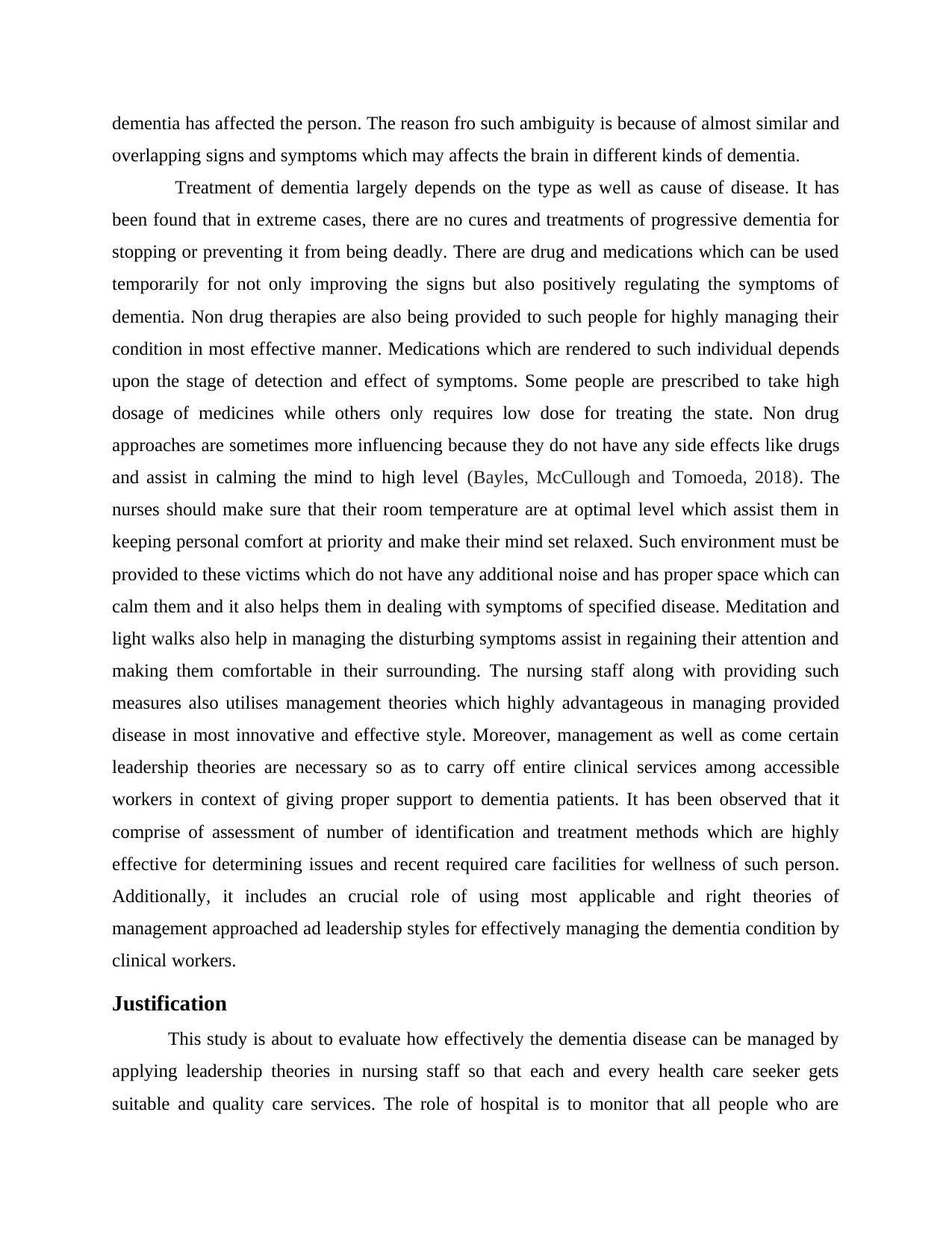
dementia has affected the person. The reason fro such ambiguity is because of almost similar and
overlapping signs and symptoms which may affects the brain in different kinds of dementia.
Treatment of dementia largely depends on the type as well as cause of disease. It has
been found that in extreme cases, there are no cures and treatments of progressive dementia for
stopping or preventing it from being deadly. There are drug and medications which can be used
temporarily for not only improving the signs but also positively regulating the symptoms of
dementia. Non drug therapies are also being provided to such people for highly managing their
condition in most effective manner. Medications which are rendered to such individual depends
upon the stage of detection and effect of symptoms. Some people are prescribed to take high
dosage of medicines while others only requires low dose for treating the state. Non drug
approaches are sometimes more influencing because they do not have any side effects like drugs
and assist in calming the mind to high level (Bayles, McCullough and Tomoeda, 2018). The
nurses should make sure that their room temperature are at optimal level which assist them in
keeping personal comfort at priority and make their mind set relaxed. Such environment must be
provided to these victims which do not have any additional noise and has proper space which can
calm them and it also helps them in dealing with symptoms of specified disease. Meditation and
light walks also help in managing the disturbing symptoms assist in regaining their attention and
making them comfortable in their surrounding. The nursing staff along with providing such
measures also utilises management theories which highly advantageous in managing provided
disease in most innovative and effective style. Moreover, management as well as come certain
leadership theories are necessary so as to carry off entire clinical services among accessible
workers in context of giving proper support to dementia patients. It has been observed that it
comprise of assessment of number of identification and treatment methods which are highly
effective for determining issues and recent required care facilities for wellness of such person.
Additionally, it includes an crucial role of using most applicable and right theories of
management approached ad leadership styles for effectively managing the dementia condition by
clinical workers.
Justification
This study is about to evaluate how effectively the dementia disease can be managed by
applying leadership theories in nursing staff so that each and every health care seeker gets
suitable and quality care services. The role of hospital is to monitor that all people who are
overlapping signs and symptoms which may affects the brain in different kinds of dementia.
Treatment of dementia largely depends on the type as well as cause of disease. It has
been found that in extreme cases, there are no cures and treatments of progressive dementia for
stopping or preventing it from being deadly. There are drug and medications which can be used
temporarily for not only improving the signs but also positively regulating the symptoms of
dementia. Non drug therapies are also being provided to such people for highly managing their
condition in most effective manner. Medications which are rendered to such individual depends
upon the stage of detection and effect of symptoms. Some people are prescribed to take high
dosage of medicines while others only requires low dose for treating the state. Non drug
approaches are sometimes more influencing because they do not have any side effects like drugs
and assist in calming the mind to high level (Bayles, McCullough and Tomoeda, 2018). The
nurses should make sure that their room temperature are at optimal level which assist them in
keeping personal comfort at priority and make their mind set relaxed. Such environment must be
provided to these victims which do not have any additional noise and has proper space which can
calm them and it also helps them in dealing with symptoms of specified disease. Meditation and
light walks also help in managing the disturbing symptoms assist in regaining their attention and
making them comfortable in their surrounding. The nursing staff along with providing such
measures also utilises management theories which highly advantageous in managing provided
disease in most innovative and effective style. Moreover, management as well as come certain
leadership theories are necessary so as to carry off entire clinical services among accessible
workers in context of giving proper support to dementia patients. It has been observed that it
comprise of assessment of number of identification and treatment methods which are highly
effective for determining issues and recent required care facilities for wellness of such person.
Additionally, it includes an crucial role of using most applicable and right theories of
management approached ad leadership styles for effectively managing the dementia condition by
clinical workers.
Justification
This study is about to evaluate how effectively the dementia disease can be managed by
applying leadership theories in nursing staff so that each and every health care seeker gets
suitable and quality care services. The role of hospital is to monitor that all people who are
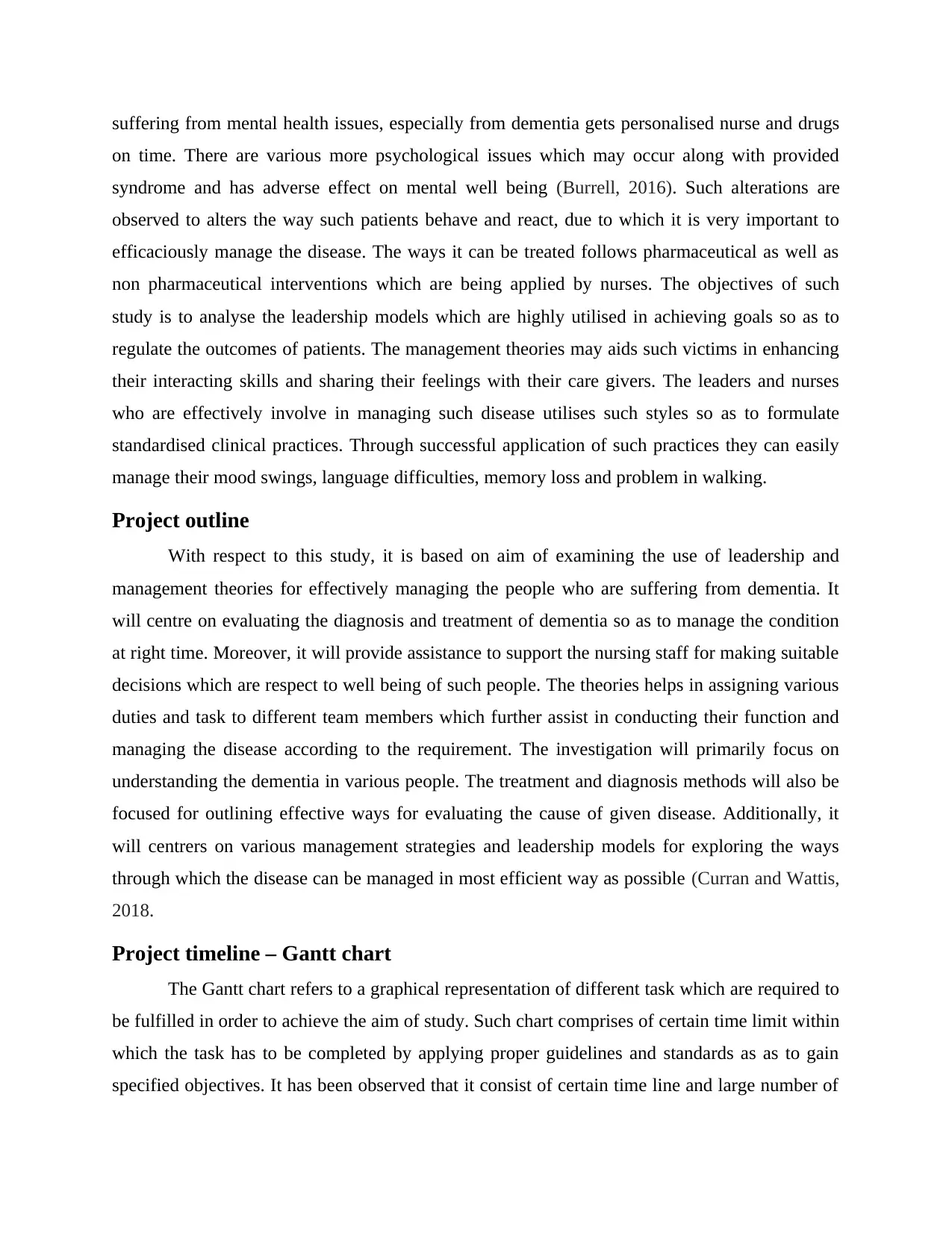
suffering from mental health issues, especially from dementia gets personalised nurse and drugs
on time. There are various more psychological issues which may occur along with provided
syndrome and has adverse effect on mental well being (Burrell, 2016). Such alterations are
observed to alters the way such patients behave and react, due to which it is very important to
efficaciously manage the disease. The ways it can be treated follows pharmaceutical as well as
non pharmaceutical interventions which are being applied by nurses. The objectives of such
study is to analyse the leadership models which are highly utilised in achieving goals so as to
regulate the outcomes of patients. The management theories may aids such victims in enhancing
their interacting skills and sharing their feelings with their care givers. The leaders and nurses
who are effectively involve in managing such disease utilises such styles so as to formulate
standardised clinical practices. Through successful application of such practices they can easily
manage their mood swings, language difficulties, memory loss and problem in walking.
Project outline
With respect to this study, it is based on aim of examining the use of leadership and
management theories for effectively managing the people who are suffering from dementia. It
will centre on evaluating the diagnosis and treatment of dementia so as to manage the condition
at right time. Moreover, it will provide assistance to support the nursing staff for making suitable
decisions which are respect to well being of such people. The theories helps in assigning various
duties and task to different team members which further assist in conducting their function and
managing the disease according to the requirement. The investigation will primarily focus on
understanding the dementia in various people. The treatment and diagnosis methods will also be
focused for outlining effective ways for evaluating the cause of given disease. Additionally, it
will centrers on various management strategies and leadership models for exploring the ways
through which the disease can be managed in most efficient way as possible (Curran and Wattis,
2018.
Project timeline – Gantt chart
The Gantt chart refers to a graphical representation of different task which are required to
be fulfilled in order to achieve the aim of study. Such chart comprises of certain time limit within
which the task has to be completed by applying proper guidelines and standards as as to gain
specified objectives. It has been observed that it consist of certain time line and large number of
on time. There are various more psychological issues which may occur along with provided
syndrome and has adverse effect on mental well being (Burrell, 2016). Such alterations are
observed to alters the way such patients behave and react, due to which it is very important to
efficaciously manage the disease. The ways it can be treated follows pharmaceutical as well as
non pharmaceutical interventions which are being applied by nurses. The objectives of such
study is to analyse the leadership models which are highly utilised in achieving goals so as to
regulate the outcomes of patients. The management theories may aids such victims in enhancing
their interacting skills and sharing their feelings with their care givers. The leaders and nurses
who are effectively involve in managing such disease utilises such styles so as to formulate
standardised clinical practices. Through successful application of such practices they can easily
manage their mood swings, language difficulties, memory loss and problem in walking.
Project outline
With respect to this study, it is based on aim of examining the use of leadership and
management theories for effectively managing the people who are suffering from dementia. It
will centre on evaluating the diagnosis and treatment of dementia so as to manage the condition
at right time. Moreover, it will provide assistance to support the nursing staff for making suitable
decisions which are respect to well being of such people. The theories helps in assigning various
duties and task to different team members which further assist in conducting their function and
managing the disease according to the requirement. The investigation will primarily focus on
understanding the dementia in various people. The treatment and diagnosis methods will also be
focused for outlining effective ways for evaluating the cause of given disease. Additionally, it
will centrers on various management strategies and leadership models for exploring the ways
through which the disease can be managed in most efficient way as possible (Curran and Wattis,
2018.
Project timeline – Gantt chart
The Gantt chart refers to a graphical representation of different task which are required to
be fulfilled in order to achieve the aim of study. Such chart comprises of certain time limit within
which the task has to be completed by applying proper guidelines and standards as as to gain
specified objectives. It has been observed that it consist of certain time line and large number of
⊘ This is a preview!⊘
Do you want full access?
Subscribe today to unlock all pages.

Trusted by 1+ million students worldwide
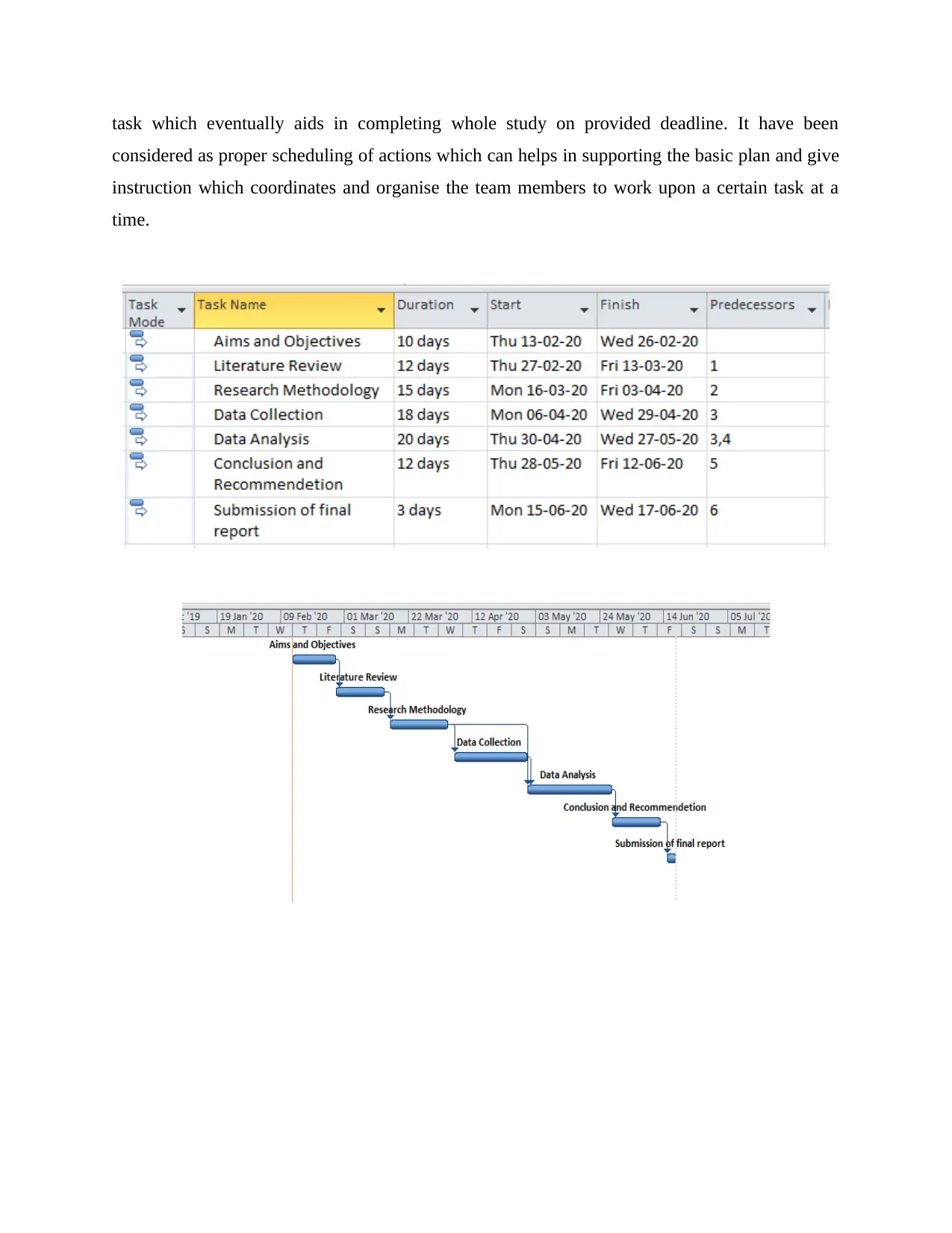
task which eventually aids in completing whole study on provided deadline. It have been
considered as proper scheduling of actions which can helps in supporting the basic plan and give
instruction which coordinates and organise the team members to work upon a certain task at a
time.
considered as proper scheduling of actions which can helps in supporting the basic plan and give
instruction which coordinates and organise the team members to work upon a certain task at a
time.
Paraphrase This Document
Need a fresh take? Get an instant paraphrase of this document with our AI Paraphraser
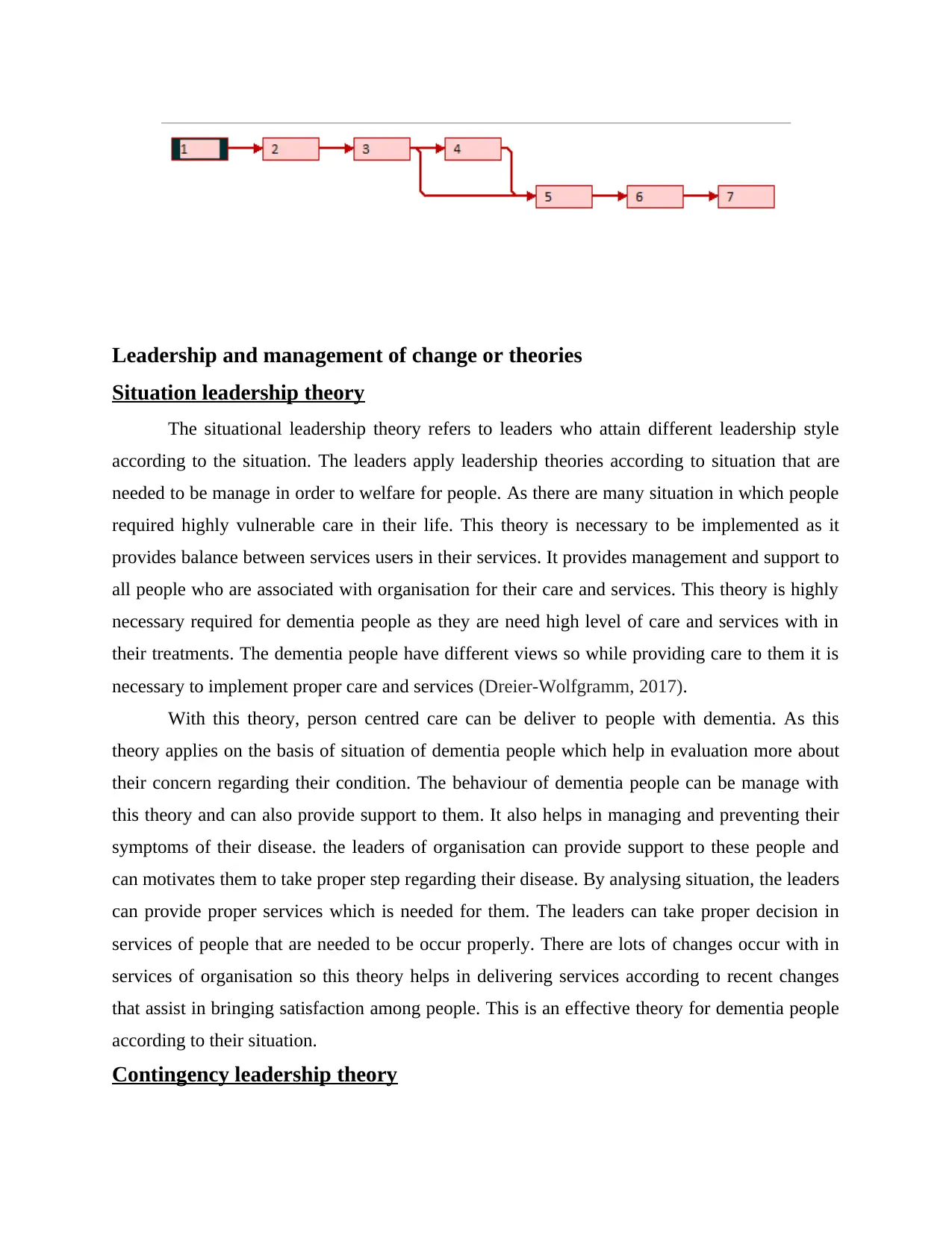
Leadership and management of change or theories
Situation leadership theory
The situational leadership theory refers to leaders who attain different leadership style
according to the situation. The leaders apply leadership theories according to situation that are
needed to be manage in order to welfare for people. As there are many situation in which people
required highly vulnerable care in their life. This theory is necessary to be implemented as it
provides balance between services users in their services. It provides management and support to
all people who are associated with organisation for their care and services. This theory is highly
necessary required for dementia people as they are need high level of care and services with in
their treatments. The dementia people have different views so while providing care to them it is
necessary to implement proper care and services (Dreier-Wolfgramm, 2017).
With this theory, person centred care can be deliver to people with dementia. As this
theory applies on the basis of situation of dementia people which help in evaluation more about
their concern regarding their condition. The behaviour of dementia people can be manage with
this theory and can also provide support to them. It also helps in managing and preventing their
symptoms of their disease. the leaders of organisation can provide support to these people and
can motivates them to take proper step regarding their disease. By analysing situation, the leaders
can provide proper services which is needed for them. The leaders can take proper decision in
services of people that are needed to be occur properly. There are lots of changes occur with in
services of organisation so this theory helps in delivering services according to recent changes
that assist in bringing satisfaction among people. This is an effective theory for dementia people
according to their situation.
Contingency leadership theory
Situation leadership theory
The situational leadership theory refers to leaders who attain different leadership style
according to the situation. The leaders apply leadership theories according to situation that are
needed to be manage in order to welfare for people. As there are many situation in which people
required highly vulnerable care in their life. This theory is necessary to be implemented as it
provides balance between services users in their services. It provides management and support to
all people who are associated with organisation for their care and services. This theory is highly
necessary required for dementia people as they are need high level of care and services with in
their treatments. The dementia people have different views so while providing care to them it is
necessary to implement proper care and services (Dreier-Wolfgramm, 2017).
With this theory, person centred care can be deliver to people with dementia. As this
theory applies on the basis of situation of dementia people which help in evaluation more about
their concern regarding their condition. The behaviour of dementia people can be manage with
this theory and can also provide support to them. It also helps in managing and preventing their
symptoms of their disease. the leaders of organisation can provide support to these people and
can motivates them to take proper step regarding their disease. By analysing situation, the leaders
can provide proper services which is needed for them. The leaders can take proper decision in
services of people that are needed to be occur properly. There are lots of changes occur with in
services of organisation so this theory helps in delivering services according to recent changes
that assist in bringing satisfaction among people. This is an effective theory for dementia people
according to their situation.
Contingency leadership theory
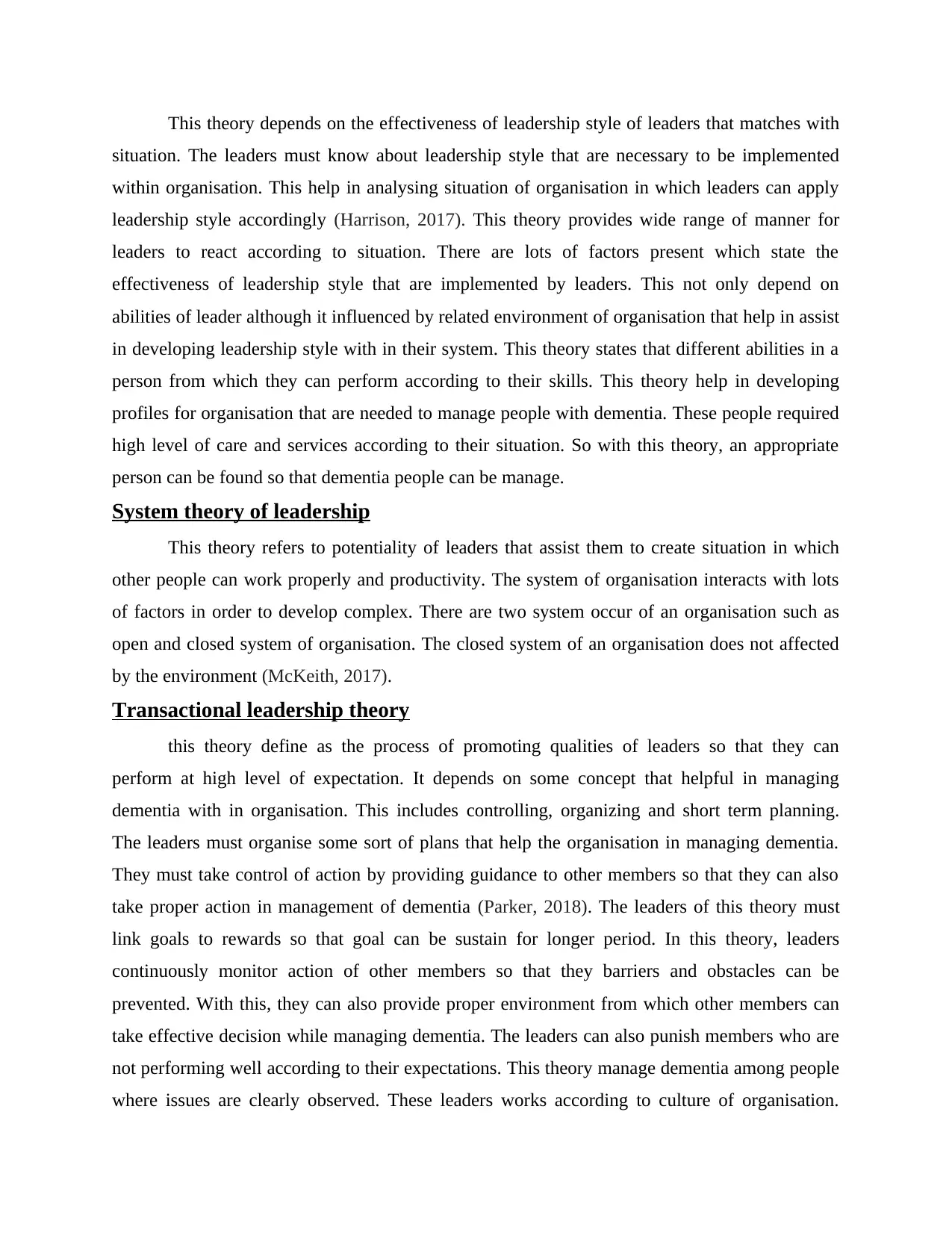
This theory depends on the effectiveness of leadership style of leaders that matches with
situation. The leaders must know about leadership style that are necessary to be implemented
within organisation. This help in analysing situation of organisation in which leaders can apply
leadership style accordingly (Harrison, 2017). This theory provides wide range of manner for
leaders to react according to situation. There are lots of factors present which state the
effectiveness of leadership style that are implemented by leaders. This not only depend on
abilities of leader although it influenced by related environment of organisation that help in assist
in developing leadership style with in their system. This theory states that different abilities in a
person from which they can perform according to their skills. This theory help in developing
profiles for organisation that are needed to manage people with dementia. These people required
high level of care and services according to their situation. So with this theory, an appropriate
person can be found so that dementia people can be manage.
System theory of leadership
This theory refers to potentiality of leaders that assist them to create situation in which
other people can work properly and productivity. The system of organisation interacts with lots
of factors in order to develop complex. There are two system occur of an organisation such as
open and closed system of organisation. The closed system of an organisation does not affected
by the environment (McKeith, 2017).
Transactional leadership theory
this theory define as the process of promoting qualities of leaders so that they can
perform at high level of expectation. It depends on some concept that helpful in managing
dementia with in organisation. This includes controlling, organizing and short term planning.
The leaders must organise some sort of plans that help the organisation in managing dementia.
They must take control of action by providing guidance to other members so that they can also
take proper action in management of dementia (Parker, 2018). The leaders of this theory must
link goals to rewards so that goal can be sustain for longer period. In this theory, leaders
continuously monitor action of other members so that they barriers and obstacles can be
prevented. With this, they can also provide proper environment from which other members can
take effective decision while managing dementia. The leaders can also punish members who are
not performing well according to their expectations. This theory manage dementia among people
where issues are clearly observed. These leaders works according to culture of organisation.
situation. The leaders must know about leadership style that are necessary to be implemented
within organisation. This help in analysing situation of organisation in which leaders can apply
leadership style accordingly (Harrison, 2017). This theory provides wide range of manner for
leaders to react according to situation. There are lots of factors present which state the
effectiveness of leadership style that are implemented by leaders. This not only depend on
abilities of leader although it influenced by related environment of organisation that help in assist
in developing leadership style with in their system. This theory states that different abilities in a
person from which they can perform according to their skills. This theory help in developing
profiles for organisation that are needed to manage people with dementia. These people required
high level of care and services according to their situation. So with this theory, an appropriate
person can be found so that dementia people can be manage.
System theory of leadership
This theory refers to potentiality of leaders that assist them to create situation in which
other people can work properly and productivity. The system of organisation interacts with lots
of factors in order to develop complex. There are two system occur of an organisation such as
open and closed system of organisation. The closed system of an organisation does not affected
by the environment (McKeith, 2017).
Transactional leadership theory
this theory define as the process of promoting qualities of leaders so that they can
perform at high level of expectation. It depends on some concept that helpful in managing
dementia with in organisation. This includes controlling, organizing and short term planning.
The leaders must organise some sort of plans that help the organisation in managing dementia.
They must take control of action by providing guidance to other members so that they can also
take proper action in management of dementia (Parker, 2018). The leaders of this theory must
link goals to rewards so that goal can be sustain for longer period. In this theory, leaders
continuously monitor action of other members so that they barriers and obstacles can be
prevented. With this, they can also provide proper environment from which other members can
take effective decision while managing dementia. The leaders can also punish members who are
not performing well according to their expectations. This theory manage dementia among people
where issues are clearly observed. These leaders works according to culture of organisation.
⊘ This is a preview!⊘
Do you want full access?
Subscribe today to unlock all pages.

Trusted by 1+ million students worldwide
1 out of 24
Related Documents
Your All-in-One AI-Powered Toolkit for Academic Success.
+13062052269
info@desklib.com
Available 24*7 on WhatsApp / Email
![[object Object]](/_next/static/media/star-bottom.7253800d.svg)
Unlock your academic potential
Copyright © 2020–2026 A2Z Services. All Rights Reserved. Developed and managed by ZUCOL.





